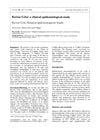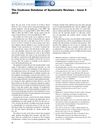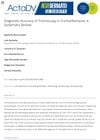 19 citations,
October 2008 in “Journal der Deutschen Dermatologischen Gesellschaft”
19 citations,
October 2008 in “Journal der Deutschen Dermatologischen Gesellschaft” Anti-cancer treatments can cause reversible hair loss, skin sensitivity, pigmentation changes, nail damage, and skin reactions, with a need for more research on managing these side effects.
 3 citations,
February 2005 in “Expert Opinion on Investigational Drugs”
3 citations,
February 2005 in “Expert Opinion on Investigational Drugs” New treatments for hair loss are being developed using molecular biology.
 24 citations,
March 1998 in “Mycoses”
24 citations,
March 1998 in “Mycoses” Early diagnosis and effective treatment of kerion Celsi prevent scarring and permanent hair loss.
 38 citations,
March 2017 in “Expert Opinion on Investigational Drugs”
38 citations,
March 2017 in “Expert Opinion on Investigational Drugs” Bimatoprost is promising for treating some types of hair loss but needs more testing for androgenetic alopecia.
 19 citations,
June 2001 in “Annals of Internal Medicine”
19 citations,
June 2001 in “Annals of Internal Medicine” Tamoxifen can cause total hair loss but its benefits outweigh this side effect.
 16 citations,
March 2017 in “Bone Marrow Transplantation”
16 citations,
March 2017 in “Bone Marrow Transplantation” Some children who had stem cell transplants developed permanent hair loss, especially when treated with a drug called busulphan.
 July 2018 in “Elsevier eBooks”
July 2018 in “Elsevier eBooks” Telogen Effluvium is a common, usually reversible hair loss condition, often improved by removing the trigger and possibly treated with various products, though their effectiveness is uncertain.
 724 citations,
April 2004 in “Lancet Oncology”
724 citations,
April 2004 in “Lancet Oncology” Chemotherapy in the first trimester of pregnancy is risky, but in the second and third trimesters, it's generally safe with careful drug selection and timing.
 152 citations,
April 2012 in “Recent Patents on Inflammation & Allergy Drug Discovery”
152 citations,
April 2012 in “Recent Patents on Inflammation & Allergy Drug Discovery” Minoxidil treats hair loss, promotes growth, has side effects, and has recent patents.
 31 citations,
January 2015 in “Journal of The American Academy of Dermatology”
31 citations,
January 2015 in “Journal of The American Academy of Dermatology” Prostaglandin F2α analogs show promise for treating certain types of hair loss but need more research for other skin conditions.
 7 citations,
February 2004 in “Clinical and Experimental Ophthalmology”
7 citations,
February 2004 in “Clinical and Experimental Ophthalmology” Finasteride, often used for hair loss, can potentially cause cataracts.
 9 citations,
April 2018 in “JAMA Dermatology”
9 citations,
April 2018 in “JAMA Dermatology” Topical minoxidil improves hair loss in 80% of women with breast cancer undergoing endocrine therapy.
 7 citations,
July 2011 in “Survey of Ophthalmology”
7 citations,
July 2011 in “Survey of Ophthalmology” The document concludes that periocular hair disorders have various causes and treatments, and proper evaluation by specialists is important for management and prognosis.
 16 citations,
March 2016 in “Clinical ophthalmology”
16 citations,
March 2016 in “Clinical ophthalmology” Bimatoprost is safe and improves eyelash growth in healthy kids but not in those with eyelash loss from chemotherapy or alopecia.
 44 citations,
April 2006 in “Expert opinion on drug safety”
44 citations,
April 2006 in “Expert opinion on drug safety” Gefitinib can cause skin problems, diarrhea, and nausea, but rarely causes severe lung disease or hair loss.
 53 citations,
May 2001 in “The American journal of the medical sciences”
53 citations,
May 2001 in “The American journal of the medical sciences” Chemotherapy can cause various skin problems, and recognizing them helps improve patient care.
 2 citations,
May 2022 in “Cutis”
2 citations,
May 2022 in “Cutis” Taking too much Albendazole can cause hair loss and other serious side effects.
February 2024 in “Frontiers in Cell and Developmental Biology” Eribulin-based chemotherapy is more effective and has fewer side effects for advanced triple-negative breast cancer.

Taking too much Albendazole can cause hair loss and other serious side effects.
 2 citations,
March 2021 in “Cutis”
2 citations,
March 2021 in “Cutis” Some breast cancer treatments, like taxanes, can cause long-term hair loss.
 2 citations,
October 2021 in “Exploration of targeted anti-tumor therapy”
2 citations,
October 2021 in “Exploration of targeted anti-tumor therapy” Breast cancer hormone therapy can cause hair loss, which can be treated with daily applications of specific topical solutions like minoxidil and hydrocortisone butyrate.
 4 citations,
November 2011 in “Archives of Dermatology”
4 citations,
November 2011 in “Archives of Dermatology” Hamilton scale imprecise, hair shaft diameter decreases, stem cell transplant regrows hair, ECP ineffective for alopecia areata universalis.
 4 citations,
May 1999 in “PubMed”
4 citations,
May 1999 in “PubMed” Some medications can cause reversible hair loss by affecting hair growth cycles.
 25 citations,
February 2017 in “Anticancer Research/Anticancer research”
25 citations,
February 2017 in “Anticancer Research/Anticancer research” Ozone therapy might improve cancer treatment and reduce its side effects.
 15 citations,
June 2014 in “Integrative cancer therapies”
15 citations,
June 2014 in “Integrative cancer therapies” Pranic meditation significantly improved mental health and quality of life for breast cancer survivors.
 January 2018 in “Springer eBooks”
January 2018 in “Springer eBooks” Cancer treatments targeting specific cells often cause skin, hair, and nail problems, affecting patients' lives and requiring careful management.
 May 2012 in “Journal of Evidence-Based Medicine”
May 2012 in “Journal of Evidence-Based Medicine” The Cochrane Database published its 5000th review in 2012, covering various health topics and updating conclusions based on new research.
 8 citations,
June 2021 in “Acta dermato-venereologica”
8 citations,
June 2021 in “Acta dermato-venereologica” Trichoscopy is a reliable method for diagnosing hair-pulling disorder.
278 citations,
May 2013 in “Ca” Targeted anticancer therapies can cause severe side effects similar to traditional chemotherapy, but with different types.
12 citations,
February 2022 in “Frontiers in Pharmacology” Asparagus racemosus and Withania somnifera can help reduce side effects of a cancer drug.



























